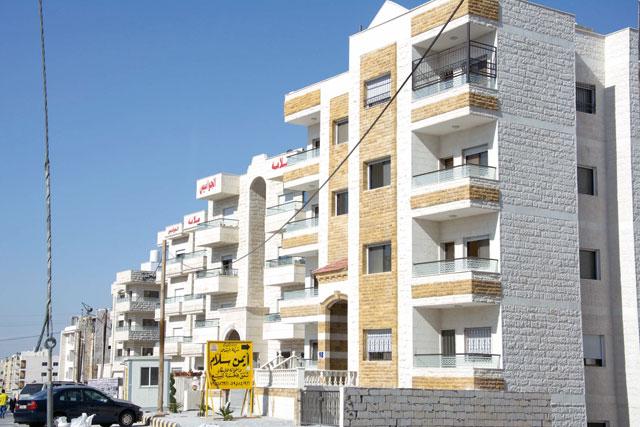You are here
Housing developers turning away from Jordanian market
By Maram Kayed - Nov 04,2018 - Last updated at Nov 04,2018
AMMAN — An estimated JD400-million worth of investments in the housing development sector have been withdrawn from the local market and directed towards nearby countries such as Turkey, Egypt and Dubai, according to the President of the Jordan Housing Developers Association (JHDA) Zuhair Omari.
“Housing developers are tempted to leave the local market because the business is taking the biggest hit that has been recorded in years,” Omari noted, adding: “Our statistics show that Jordanian investments in Dubai alone amount to JD900 million, rising mainly over the last two years, at the expense of the local market”.
According to Omari, this shift from local to regional markets is “largely due to the new building by-law”.
The building by-law, which went into effect earlier this year and drove housing companies to a strike, stipulates that apartments must be at least 110sq.m in classifications B, C and D, and 130sq.m in classification A.
This, according to JHDA’s numbers, contrasts with buyers’ preferences, as 32 per cent of Jordanians who bought apartments in 2017 chose ones that were smaller than 120sq.m.
Bashar Abumleiha, a real-estate agent, said: “Most families have limited income and take loans just to buy an 80-90sq.m apartment, so it’s only logical that they won’t be able to afford a 110sq.m one”.
Mohammed Bader, a Jordanian citizen residing in Saudi Arabia, said he “gave up trying to find a decent apartment with a reasonable price. I’m not going to buy a huge apartment that is way larger than what I need and a lot more than I can afford”.
Some developers and investors also said the by-law poses a problem. “The land is expensive, and so are the material and workers’ wages. What compensates us is being able to rent out two apartments on each floor, which is now out of the question with this new law,” said Abu Hussein Adwan, a housing-development company owner.
As some citizens and developers expressed their discontent towards the new law, others said that the law “is part of, but not the whole, problem”. Housing business owners such as Adwan and his partners stated that “the problems with the sector have been piling up. It’s not a complication that arose overnight”.
Recent numbers show that the total value of unsold apartments since 2015, three years before the law went into effect, exceeds JD1 billion.
In 2018, however, the situation was exacerbated when trading in the sector, between January and August, witnessed a decline of 13 per cent compared with the same period last year.
Omari noted “high increases in prices and taxes, as well as over-complicated regulations” over the past couple of years have caused the JD6-billion sector to deteriorate.
“Investors do not appreciate it when regulations get in the way of their business interests, especially when their revenues are already down as of the last three years,” he pointed out.
“The market was in its best form in the years 2011 to 2014, but now that business has slowed down, it’s time we pack up and find a market on the rise, such as Turkey,” said Tamer Qudah, a housing developer planning to move his business out of Jordan by the end of this year.
Related Articles
AMMAN — Housing developers on Sunday said they will resort to escalatory measures to protest against the 2018 building by-law.Zuhair Omari,
AMMAN — Housing developers will hold a week-long work strike to be followed by a sit-in to protest the recently endorsed building by-law, wh
AMMAN — Housing developers on Wednesday slammed the endorsement of the building by-law which will soon go into effect, saying the move will



















